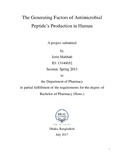The Generating factors of antimicrobial peptide’s production in human

View/
Date
2017-07-26Publisher
BRAC UniversityAuthor
Mahbub, JerinMetadata
Show full item recordAbstract
Antimicrobial peptide (AMP) has been recognized as a noble antibiotic against wide range of bacteria now a days. Isolated AMPs from various sources are used to control a number of diseases in humans. To reinforce their expression, some factors can be used to work on specific parts of human body. In this study, we accumulate seven factors which assist production of cathelicidin and defensins family of human AMPs. Vitamin D3 and bile salt prompt up cathelicidin expression in various epithelial cell lines through vitamin D receptor and farnesoid X receptor as respectively. On the other side, beta defensins can be induced by epigallocatechin-3-gallate, isoleucine, sulphoraphane and platelet release growth factor in targeted areas. Lastly, phenylbutyrate works on both cathelicidin and beta defensin 1. Most of them work effectively in dose and time dependent manner. In some cases, the combination therapy of two or three of them have been turned out positively than their individual action which is also highlighted here. In spite of their usefulness, some obstacles are still lagging behind them from implementation which need further investigation. This study clearly indicates that all the elements successfully elevate antimicrobial peptide expression within the body and also improve innate immunity to fight against infections in both primary and critical stages.
